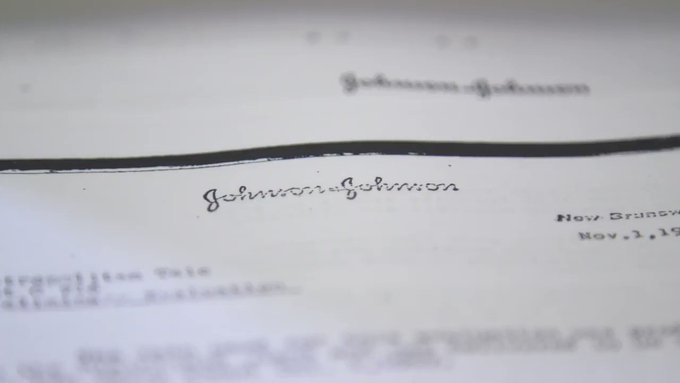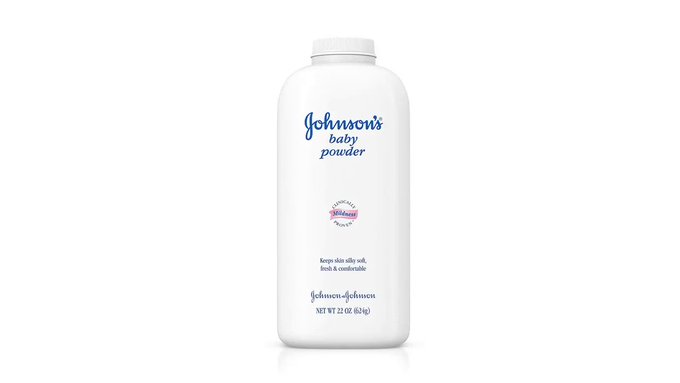Vanmorgen
in het BBC World Service radionieuws van 10.00 u. (CET), het bericht
dat Johnson en Johnson door eigen onderzoek al vele decennia op de
hoogte is van het feit dat haar talkpoeder het kankerverwekkende
asbest kan bevatten, maar het bedrijf heeft dit 'uiteraard' onder de pet
gehouden.......
Vanaf
1971 tot het jaar 2000 werd er intern veel over dit probleem
gesproken, zonder de klanten van het product te waarschuwen, terwijl
dit poeder met name veel voor baby's wordt gebruikt.......
Het
bedrijf ontkent dat er sprake zou zijn geweest van asbest in haar
talkpoeder, echter die leugen heeft niet geholpen: het aandeel is in
een vrije vlucht (richting bodem) beland..... (hoewel dat niet veel
zegt, aandeelhouders vergeten snel en zijn alleen bang voor de
antireclame, de gezondheid van de gebruikers zal hen worst zijn)
'Leve
het inhumane, fascistische kapitalisme en neoliberalisme en weg met
de regeldruk, die maar lastig
is voor bedrijven.....' Regeldruk en inspecties die juist nodig zijn om dergelijke schandalen te voorkomen, beiden zijn ook in Nederland teruggebracht naar een volkomen onaanvaardbaar niveau..... Daarvoor zijn in Nederland vooral het CDA, de VVD, de PvdA en D66 verantwoordelijk....... (m.n. onder de kabinetten Balkenende werden een groot aantal inspecties flink afgeslankt ondergebracht in de NVWA) Tja, de centen gaan nu eenmaal altijd ver voor op onze (volks-) gezondheid..... (hoewel de kosten voor bijdragen van ons t.b.v. gezondheidszorg met het jaar verder stijgen >> geen wonder gezien alle rotzooi die verkocht mag worden...)
Published
on Friday, December 14, 2018 by Common
Dreams
Borrowing From Big Tobacco's Playbook, Johnson & Johnson Knew About Asbestos in Baby Powder for Decades: Reuters
One
attorney said 1970s memos that have surfaced due to recent lawsuits
are "on par with key docs uncovered in the tobacco litigation."

For
decades, Reuters noted,
"J&J has promoted its iconic Baby Powder as a safe, gentle
product for babies and adults alike." (Photo: Reuters)
(een foto als de eerste moet je tegenwoordig niet meer maken)
A Reuters investigation published
Friday charges that Johnson & Johnson, a multi-billion dollar
company known for
its healthcare products, knew for decades that its iconic talcum baby
powder "was sometimes tainted with carcinogenic asbestos,"
but concealed the information from regulators and the public.
(Let op in het hieronder getoonde Twitterbericht zit een video die ik niet kan overnemen, hier nogmaals de link naar het originele artikel)

Johnson & Johnson knew for decades that asbestos lurked in its Baby Powder reut.rs/2zSGGxx via @ReutersTV @specialreports
Asbestos,
"the name given to six minerals that occur naturally in the
environment as bundles of fibers," has been used in North
America's automotive, construction, and shipbuilding industries since
the late 1800s, according
to the
National Cancer Institute. The World Health Organization
(WHO) warns that
"all types of asbestos cause lung cancer, mesothelioma, cancer
of the larynx and ovary, and asbestosis (fibrosis of the lungs)."
Because
asbestos sometimes occurs in the earth along with
talc, contamination is
possible. Reuters—along
with attorneys for more than 11,000 plaintiffs currently suing
Johnson & Johnson, claiming the company's products caused their
cancer—examined memos, internal reports, and other confidential
documents as well as deposition and trial testimony.
That mountain of evidence, according to Reuters, revealed that from at least 1971 to the early 2000s, the company's raw talc and finished powders sometimes tested positive for small amounts of asbestos, and that company executives, mine managers, scientists, doctors, and lawyers fretted over the problem and how to address it while failing to disclose it to regulators or the public.
The
documents also depict successful efforts to influence U.S.
regulators' plans to limit asbestos in cosmetic talc products
and scientific
research on
the health effects of talc.
While,
over the past two decades, some legal challenges claiming that
Johnson & Johnson products were tainted with asbestos and caused
cancer have been unsuccessful, three recent developments seem to
signal a shift. A pair of cases in New Jersey and California saw
significant awards for mesothelioma patients, and a "watershed"
verdict in St. Louis expanded the company's potential liability.
Outlining
the St. Louis case, Reuters explained:
The
22 plaintiffs were the first to succeed with a claim that
asbestos-tainted Baby Powder and Shower to Shower talc, a longtime
brand the company sold in 2012, caused ovarian cancer, which is much
more common than mesothelioma. The jury awarded them $4.69 billion in
damages. Most of the talc cases have been brought by women with
ovarian cancer who say they regularly used J&J talc products as a
perineal antiperspirant and deodorant.
"When
people really understand what's going on," said Mark Lanier, an
attorney for one of the plaintiffs, "I think it increases J&J's
exposure a thousand-fold."
Johnson
& Johnson, as Reuters noted,
"has dominated the talc powder market for more than 100 years,
its sales outpacing those of all competitors combined... And while
talc products contributed just $420 million to J&J's $76.5
billion in revenue last year, Baby Powder is considered an essential
facet of the healthcare-products maker's carefully tended image as a
caring company—a 'sacred cow,' as one 2003 internal email put it."
Another
attorney who's not tied to the cases against Johnson &
Johnson concluded
on Twitter that
the 1970s memos mentioned in Reuters'
report are "on par with key docs uncovered in the tobacco
litigation."
Johnson
& Johnson, meanwhile, has vowed to appeal all verdicts against it
and maintains that its products are safe. The company's vice
president of global media relations, Ernie Knewitz, wrote in an email
to Reuters:
Plaintiffs attorneys out for personal financial gain are distorting historical documents and intentionally creating confusion in the courtroom and in the media... This is all a calculated attempt to distract from the fact that thousands of independent tests prove our talc does not contain asbestos or cause cancer. Any suggestion that Johnson & Johnson knew or hid information about the safety of talc is false.
Following the report, the publicly traded company's shares plummeted by more than 11 percent.
(Let op in het hieronder getoonde Twitterbericht zit een video die ik niet kan overnemen, hier nogmaals de link naar het originele artikel)
Johnson & Johnson shares on track to post their biggest percentage drop in more than a decade after @Reuters reports J&J knew of asbestos in its Baby Powder: reut.rs/2EvqQg2 Read the report: reut.rs/2S1kDeS
This
work is licensed under a Creative Commons Attribution-Share Alike 3.0
License
(mijn excuus voor de belabberde weergave)



Geen opmerkingen:
Een reactie posten